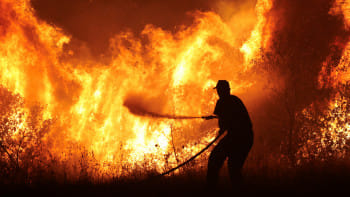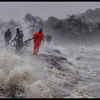Lacking moral capital to overcome climate paralysis

Amidst what the UN chief dubs "an era of global boiling," we stand at the abyss of a paradigm cataclysm, yet remain paralysed in our actions.
After years of endless sustainability dialogues, the UN 2030 Sustainable Development Goals (SDGs) and today, 29th Conferences of Participants (COPs), we are still debating what to do and how to fund agreed plans. The climate scientists warn that we are already too late to stop the temperature rising above 1.5 degrees Celsius. There are many excuses, but mostly it is about lacking the moral courage to act.
Climate change is a whole system change. This goes beyond theory to real-world action that must overcome vested interest barriers to change. Since complex systems cover both the meta (thinking), macro-trends, meso-institutional aspects and micro-details, partial action in one area may not move the planetary whole in the right direction. Visionary systems thinker, Donna Meadows, argued that true systems change starts with a paradigm shift. She thought that we must find the "leverage points," where small actions have a big systemic impact. Where do we begin?
Throughout the ages, civilisations have collapsed because the few used mental colonisation to enslave the majority, destroying their own foundations. Artificial Intelligence is another form of mental colonisation that can be for the good or bad. Today, we face the moral choice to act now for the common good or boil in our metaverse of denial.
The lowest common factor in human activity that damages the planet is the individual, but most individuals feel that they are too miniscule to change collective behaviour. True, climate warming is the complex interaction between individuals, communities, nation-states and their interactive impact on the planet and vice versa. However, collective action is necessary, but not sufficient. Making change has to start with the individual, yet most of us lack the moral courage to change.
We all wear three hats: individuals look after the family; then our role in institutions (business or state); and finally, as a responsible world citizen, caring for others and the environment.
Unfortunately, the mainstream capitalist profit orientation that promotes individual greed puts us in perpetual conflict between these three functions. We have to re-orient our paradigm from the capitalist owner of individual rights to becoming a steward entrusted with the well-being of all life, human or other, as well as our planet as a whole. Stewardship is not gratification of needs of one generation, but survival of all life and the planet for generations to come.
Modern capitalism was shaped by thinkers like Adam Smith, arguing that the "Wealth of Nations" can be advanced by free markets and specialization. But Adam Smith was also a moral philosopher. Misinterpretations of Adam Smith's theories forgot that capitalism has a moral obligation to social and planetary justice. The Domination Code, embraced in Genesis 1:27 where God made Man as master to rule over other humans and all other creatures, should be re-interpreted as steward over all life, consciousness and the planet as a whole.
Our present relentless excesses in consumption that is pumping out carbon, depleting natural resources, is funded by exponential growth in financial debt. Debt is slavery, bondage for humans as serfs to agricultural landlords, blue-collar slaves to industrial barons, and white-collar debt-slaves to banks.
Startling statistics lay bare the financialisation trap: 15 percent of low-income countries grapple with debt distress, while an additional 45 percent teeter on the brink. Advanced countries print debt, and emerging markets struggle to repay debt or go into default.
So far, no philosopher, artist or politician has the "Grand Narrative" to show how individuals, organisations, nations or multilateral bodies have either agency or ability to cut the Gordian knot of complex climate change. The left hand is blaming the right hand for the faults of the body, and instead of cooperating, they fight even as the body is being boiled alive.
In her current G20 presidency, India has advanced the vision of "One Earth, One Family, One Future." Underlying this vision is the view that somehow someone must sacrifice for the greater good. The stark issue is that the rich advanced nations, who can afford to "degrow" refuse to do so, arguing that it is the demographically younger and poorer developing countries who should bear the brunt of change.
The capitalist model is unsustainable because of its linearity in thinking that growth equals development. Capitalism advances in sequential complexity from agriculture to industry to services, assuming that technology can solve all problems. But moving to a metaverse world of digital imagination cannot disguise the reality that humans are abused and enslaved, whilst the planet is being corroded by biodiversity loss, pollution and material destruction. The circular economy is correct at two levels. First, the service economy should use technology, not for financialisation and consumption, but to apply the best know-how to re-generate our natural environment, harness our human energy to cure human injustices and work towards environmental, social and governance well-being. Second, the rich must give in charity and resources, so that there is a fairer social balance. We can grow in human and planetary consciousness and well-being, without growth in physical consumption through natural destruction.
Turning the linear to the circular requires subtle measures, like the Indian campaign, Lifestyle for Environment (LiFE) and Social Stock Exchange (SSE), enabling resources to fund social enterprises that work to help the masses uplift themselves.
All these initiatives are in the right direction, but we do not have the time as the planet is already boiling. For every initiative working for the common good, there are green-washing and denial activities that preach morality but practice immorality.
Thus, addressing the climate crisis requires mobilising our global moral capital. The root of the problem lies not outside, but within each of us in the form of ignorance, greed and fear of letting go of the status quo.
If we lack the courage and determination to choose, we allow ourselves to be manipulated for our individual and collective bad. Advertising tells us daily that eating beef is good, forgetting that producing meat for consumption deploys 75 percent of the global agricultural land, using fossil-based fertilisers and pesticides to damage our soil and biodiversity. If each of us in our spare time volunteer time or money towards restorative projects, our cumulative efforts would have a widespread impact on our community life and the global common good.
Throughout the ages, civilisations have collapsed because the few used mental colonisation to enslave the majority, destroying their own foundations. Artificial Intelligence is another form of mental colonisation that can be for the good or bad. Today, we face the moral choice to act now for the common good or boil in our metaverse of denial.
Capitalism is cannibalistically eating both our human and natural capital. It is about the ego rather than the eco. To think and not to act is itself a moral decision. That is the drop of courage that will become an ocean of change.
Andrew Sheng is a distinguished fellow of Asia Global Institute, University of Hong Kong, and chief adviser to the China Banking Regulatory Commission.
Views in this article are the author's own.
Follow The Daily Star Opinion on Facebook for the latest opinions, commentaries and analyses by experts and professionals. To contribute your article or letter to The Daily Star Opinion, see our guidelines for submission.

 For all latest news, follow The Daily Star's Google News channel.
For all latest news, follow The Daily Star's Google News channel. 











Comments